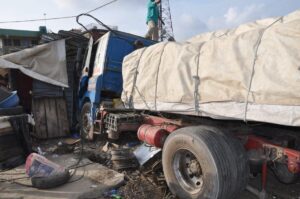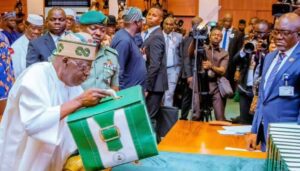
Economic recovery: CBN deploys over N3.5trn to boost critical sectors
…Disburses N363.5bn to over 767,000 Nigerian households, micro businesses
…Spends N107.7bn to support healthcare projects across Nigeria
By Abimbola Abatta and Uthman Salami
The Central Bank of Nigeria (CBN) has deployed over N3.5 trillion into critical sectors as part of the efforts to stimulate the recovery of Nigeria’s economy from the external and domestic impact of COVID-19 pandemic.
Governor, Central Bank of Nigeria, Godwin Emefiele, disclosed this last week while delivering his Keynote Address at the 56th CIBN Annual Bankers Dinner in Lagos State.
Emefiele, who said the CBN instituted the Economic Sustainability Plan (ESP) as the first measure to stabilise the economy, revealed that the CBN deployed the fund to boost key sectors including agriculture, manufacturing, electricity, and healthcare.
He also noted that N363.5 billion has been disbursed to more than 767,000 Nigerian households and micro businesses, adding that over N107.7 billion has been released to fund 114 healthcare projects.
The financed health projects, according to him, include cancer treatment centres, medical diagnostics, pharmaceuticals, dental services, eye clinics, and other healthcare service providers.
“It is gratifying to state that the Central Bank of Nigeria deployed more than N3.5trillion, – about 4.1 percent of Nigeria’s GDP to critical sectors such as agriculture, manufacturing, electricity, and healthcare in order to stimulate and help the economy recover from the deep shock.”
He said other specific policy measures undertaken include, “Reduction of the monetary policy rate from 13.5 to 11.5 percent to improve the flow of credit to households and businesses; reduction of the interest rate on CBN intervention loans from 9 to 5 percent; extension of the moratorium on principal repayments for CBN intervention facility to March 2022; Granted regulatory forbearance that allow banks restructure loans given to sectors severely affected by the pandemic.”
The measures also “Strengthened the Loan to Deposit ratio policy, which has resulted in a significant rise in loans provided by financial institutions; created a N50 billion target credit facility for affected households and small and medium enterprises through the Nirsal Microfinance Bank, against which N363.5 billion has been disbursed to over 767,000 Nigerian households and micro businesses; and mobilized key stakeholders in the Nigerian economy, under the Private Sector Coalition Against COVID-19 (CACOVID) team that raised N39.646 to support the fight against the scourge.
“The funds were used to support three (3) key priority areas: (i) development of 39 fully equipped isolation centres including Intensive Care Units (ICUs) and molecular testing labs and procurement of medical equipment such as PCR test kits across the country; (ii) provision of palliatives in the form of essential food items to 1.7 million households, an equivalent of 8 million Nigerians; and (iii) improving awareness in rural awareness on the COVID-19 virus and capacity building for community health workers,” he added.
The CBN governor noted further, “So far, over N107.7 billion has been released to support 114 healthcare projects, including six (6) greenfield (new) and 108 are expansionary (brownfield). The projects financed included cancer treatment centres, medical diagnostics, pharmaceuticals, dental services, eye clinics, and other healthcare service providers.
“We are happy to inform you that the intervention programs have contributed to the increased bed space in our hospitals, and improved healthcare productivity as evident in the increased number of successfully treated Covid 19 patients.”
Globally, the COVID-19 pandemic led to an unprecedented decline as most advanced and developed economies fell into a recession.
On how the pandemic affected Nigeria’s economy, Emefiele had said its impact provided many lessons that have helped to shape subsequent actions by the Monetary Policy authorities.
According to him, “We realised how vulnerable our economy was relative to advanced markets in not only access to essential medical supplies, but in the form of monetary policy support that Central Banks in developing countries could provide in supporting the recovery of their respective economies.
“Rather than let the crisis compound our problems, we reflected on ways in which we could turn the crisis into an opportunity. One that would reset the trajectory of our economy from its dependence on imported items to one that is more resilient and productive.”
He revealed that, “The economy has remained on a positive growth path for four consecutive quarters after the recession in the 3rd quarter of 2020. 41 out of the 46 sectors assessed in the 3rd quarter by NBS, recorded positive growth, as growth was driven by significant improvements in the non-oil sector, particularly, Agriculture Manufacturing, Trade, ICT, Construction, Finance and Transportation.
“We have also witnessed a gradual recovery in manufacturing output growth as the Manufacturing PMI index rose to 47.3 points in October 2021 from 44.9 in January 2021.
“Our interventions particularly in the manufacturing and the agriculture sectors significantly helped to encourage continuous improvements in growth in these two key sectors of our economy.
“Inflation has continued to moderate for seven consecutive months, as it declined from 18.17 percent in March 2021 to 15.9 percent in October 2021 supported by improved output of staple food items.
“In an effort to implement policies that would engender growth and employment, the Central Bank of Nigeria, recently unveiled the 100 for 100 policy on production and productivity. Under this program, targeted credit of up to N5bn will be provided to 100 firms every 100 days, provided that these firms are investing in projects that are greenfield projects.”
Emefiele called for a collaboration effort between stakeholders in the private sector and the government, which according to him will “strengthen our ability to deal with the challenges of COVID-19 and stimulate further growth of our economy.”
He said, “While we have been able to contain some of the effects of the COVID-19 pandemic on our economy, it is imperative that we work to build a more resilient economy that is better able to contain external shocks, whilst supporting growth and wealth creation in key sectors of our economy.
“We must take deliberate steps to diversify the base of the Nigerian economy. As the true African Giant, we must fold our sleeves and do everything possible to stop the incidence of importing anything and everything.”



